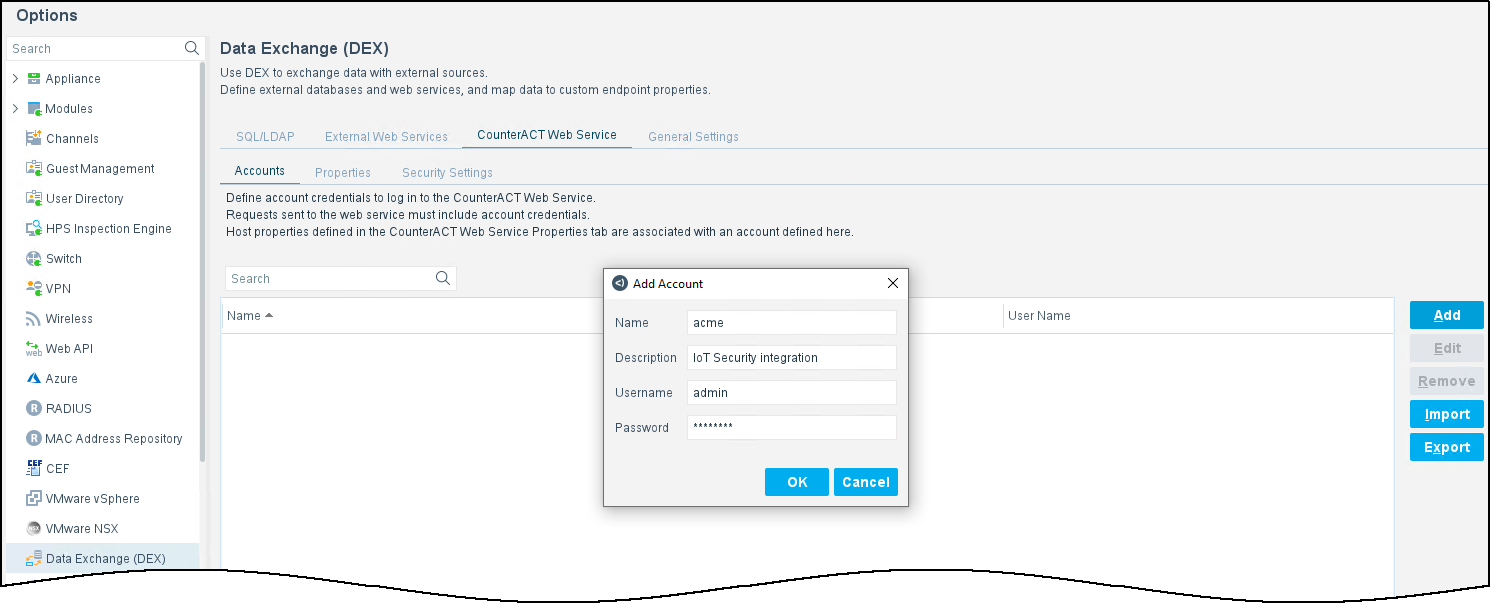Device Security
Set up Forescout for Integration
Table of Contents
Expand All
|
Collapse All
Device Security Docs
Set up Forescout for Integration
Set up Forescout for integration with Device Security through
Cortex XSOAR.
| Where Can I Use This? | What Do I Need? |
|---|---|
|
One of the following subscriptions:
One of the following Cortex XSOAR setups:
|
Configure the following on Forescout:
- A Forescout Data Exchange (DEX) account
- Host properties that Device Security can populate with device attributes
- An IP address, range, or subnet from which Forescout accepts communications
The PanwIoTQuarantine host property
will receive data that Device Security submits for use in Forescout
policies that quarantine devices and release them from quarantine.
Therefore, you must also configure these policies on Forescout:
- A quarantine policy with its condition set as PanwIoTQuarantine = on
- A policy that releases devices from quarantine with the condition set as PanwIoTQuarantine = off
- Add a Data Exchange account.
- Log in to the Forescout console and click ToolsOptionsData Exchange (DEX).To access the console, use a remote desktop application such as the Remote Desktop Connection application on Windows or Microsoft Remote Desktop for Mac.
- In the Data Exchange (DEX) section, click CounterACT Web ServiceAccounts and then Add.
- Enter the following in the Add Account dialog box that appears and then click OK:Name: Enter a name for the web service account.Description: Enter a note about the user account for future reference.Username: Enter a username that an XSOAR engine will use when authenticating itself to Forescout when interacting with it.Password: Enter a password for the user account.
![]()
Create host properties.- Click Properties and then click Add.
- Complete the three-part wizard that appears to add host properties such as the following:PanwIoTIP, PanwIoTProfile, PanwIoTCategory, PanwIoTRiskScore, PanwIoTConfidence, PanwIoTTag, PanwIoTHostname, PanwIoTOS, PanwIoTModel, PanwIoTVendor, PanwIoTSerial, PanwIoTEPP, PanwIoTInternetAccess, PanwIoTAET, PanwIoTQuarantineIf you want to enter different host property names than those shown here, change the default names for their corresponding attributes in Cortex XSOAR so they match each other. The attribute names are editable in the incremental and bulk export job settings for Forescout in the Cortex XSOAR module. See Configure Device Security and Cortex XSOAR for Forescout.
Host Property Name Description PanwIoTIP Device IP address PanwIoTProfile Device profile PanwIoTCategory Category of device PanwIoTRiskScore Risk score of device calculated by Device Security PanwIoTConfidence Device Security device identification confidence level PanwIoTTag User-defined tag applied to device in Device Security PanwIoTHostname Device hostname PanwIoTOS Device operating system PanwIoTModel Device model PanwIoTVendor Device vendor PanwIoTSerial Device serial number PanwIoTEPP If device has endpoint protection (EPP) PanwIoTInternetAccess If device has Internet access PanwIoTAET Application entity title (for DICOM devices) PanwIoTQuarantine Put device in quarantine when the value is on; remove from quarantine when the value is off The next steps explain how to add a host property. Repeat them to add all the host properties described above. - On the General tab, enter the following and then click Next:Property Name: PanwIoTIPProperty Tag (ASCII only): PanwIoTIP (automatically fills based on the Property Name)Description: Enter a note about the host property for future reference.Account: Choose the same web service account name you entered in the Name field in the Add Account dialog box.
![]()
- On the Map Data panel, select Single Value Property, choose String in the Data Type drop-down list, and then click Next.
![]()
- On the Display/Track panel, select the places in the Forescout UI where you want the host property to appear and then click Finish.
![]() When done, the Properties page will have a complete set of host properties.
When done, the Properties page will have a complete set of host properties.![]()
Set an IP address, range of addresses, or subnet from which allow connections to Forescout.- Click Security Settings and then click Add.
- Select either All IPv4 or IPv4 Range. If you select IPv4 Range, enter the IP address, range, or subnet from which Forescout will accept connections and then click OK. Make sure it includes the XSOAR engine IP address.
![]()
- Click Apply to save the configuration of your account, host properties, and security settings.
Configure policies to quarantine devices and release them from quarantine.One policy has a condition set as PanwIoTQuarantine = on and quarantines devices when the value of their PanwIoTQuarantine host property is on.The other policy has a condition set as PanwIoTQuarantine = off and releases devices when the value of their PanwIoTQuarantine host property is off.






